Home » Jazz Articles » Interview » Polar Bear: Raw and Spontaneous
Polar Bear: Raw and Spontaneous
 Polar Bear, from left: Tom Herbert, Seb Rochford, Mark Lockheart Pete Wareham, Leafcutter John
Polar Bear, from left: Tom Herbert, Seb Rochford, Mark Lockheart Pete Wareham, Leafcutter John
Both Rochford and Herbert are quiet and thoughtful. Rochford is an exceptionally softly-spoken individual whose voice betrays only occasional hints of his Scottish origins; his considered and thoughtful responses belie the stereotypical image of the loud and manic drummer. Together, Rochford and Herbert offer many insights into an innovative and exciting band that is based on friendship and mutual respect.
Four of Polar Bear's members have been together since their first album, Dim Lit (Babel, 2004), but there had been an earlier incarnation of the band. Rochford explains about the first Polar Bear lineup: "I can't really remember when, but I started the band with Rachel Musson, a saxophonist, and Amy Baldwin on double bass. We had a bass clarinetist as well, Ben Harlan. We recorded demos, just four-track stuff, but it didn't work out. Out of the current people, I think Pete [Wareham] was the first person I met. I asked another saxophonist if he wanted to join a band, but he didn't want to do it and said, 'Oh, you should phone Pete.' So I did, and there was an instant connection."
Herbert and Polar Bear's other tenor player, 
Mark Lockheart
saxophone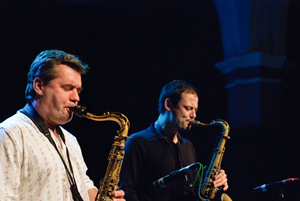
Lockheart joined after Rochford saw him playing a standards gig at London's 606 Club. "I thought he was amazing—the amount of personality he had, playing tunes I'd heard so many times before," Rochford says. "He has a really positive presence on stage, and I thought that he'd go brilliantly with Pete's way of playing." The two tenor lineup has been a constant in the band since then, but was this intentional? Rochford is happy to admit that, initially, it wasn't. "Actually, I called Pete because the guy who gave me his number told me that Pete played bass clarinet," Rochford says. And does Wareham play bass clarinet? "No," Rochford says, laughing. "I don't think he's ever played it. But by the time I found out, I didn't really care anymore; I just loved his playing."
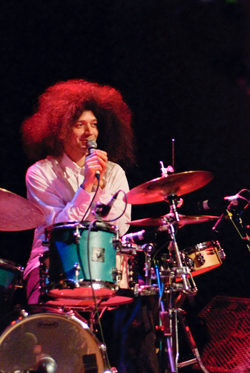 The core Polar Bear quartet was now established. The final addition was John Burton, known as Leafcutter John, who joined after the release of the first album and whose previous musical career had encompassed electronic, acoustic and folk. John plays guitar and electronics in the band, and he uses numerous original pieces of equipment to create his sounds—game controllers and balloons included. Rochford originally read an interview with John, then spent a year trying to find one of his albums. "He sounded like a really interesting person," Rochford says, "but we had completely opposite tastes in music. I remember reading the interview and thinking that I hadn't heard of any of the acts he liked." Rochford then met a sound engineer who also liked John, and a few months later the engineer contacted Rochford and asked him if he would like to play drums for John to record. "I went down to the studio, and we really got on," Rochford declares. "When I went to see his show I realized that he had a very tactile approach to playing—his electronics were improvised, very spontaneous—and I thought that could work really well within the band."
The core Polar Bear quartet was now established. The final addition was John Burton, known as Leafcutter John, who joined after the release of the first album and whose previous musical career had encompassed electronic, acoustic and folk. John plays guitar and electronics in the band, and he uses numerous original pieces of equipment to create his sounds—game controllers and balloons included. Rochford originally read an interview with John, then spent a year trying to find one of his albums. "He sounded like a really interesting person," Rochford says, "but we had completely opposite tastes in music. I remember reading the interview and thinking that I hadn't heard of any of the acts he liked." Rochford then met a sound engineer who also liked John, and a few months later the engineer contacted Rochford and asked him if he would like to play drums for John to record. "I went down to the studio, and we really got on," Rochford declares. "When I went to see his show I realized that he had a very tactile approach to playing—his electronics were improvised, very spontaneous—and I thought that could work really well within the band." It's clear from both Rochford and Herbert that Polar Bear is a collection of individuals who fit together personally as well as musically. Rochford's decision to invite the other musicians to join the band was informed by how he felt he related to them as people. This may well at least partly explain the band's comparative longevity as a unit. The partnership between Rochford and Herbert, as the band's rhythm section, sounds particularly intuitive. So how does the Rochford/Herbert partnership function? Rochford pauses to consider his answer, and Herbert responds first. "I don't think we really think about it; we never discuss it," he answers, emphatically. Rochford concurs: "I think that's one thing I love about playing with Tom. ... You don't have to think about that because it just feels so natural. Sometimes we talk about concepts or ideas that we have, that we can expand, but the fundamentals never need discussing."
Herbert goes on to talk about the space that Rochford gives Polar Bear's members through his approach to writing and arranging. "Seb gives us a lot of freedom to interpret his music," he says. "A lot of the time, he might have written just a sketch or an idea for a bass line"—Herbert and Rochford both laugh—"a starting point that I'll play around with. Then he'll tell me it's great, or he'll suggest something completely different, and I'll try to find what that might be. ... Often the stuff will change in the course of a tour or a series of gigs. Stuff will morph into something different, and if it's not in character with what he's hearing, then he'll let us know."
Peepers is a quintet album, but earlier Polar Bear releases have featured guest instrumentalists and, on one or two songs, guest vocalists. Live, however, the band rarely involves other musicians. "We played with Julia [Biel, vocalist] two or three times," Rochford explains. "

Ingrid Laubrock
saxophoneb.1970
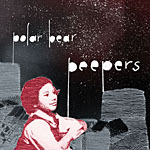 The idea of bringing in other musicians when regular band members are unavailable leads on to the thorny problem of organizing Polar Bear activities. When all five members lead such active professional careers, just how do arrangements get made? "I think if things are all good and working well, then they work in harmony together," suggests Rochford, somewhat enigmatically. "Everyone's got a certain understanding. If someone has a clash (of commitments) then you have to let it go, try to think what is best for that person and let them do it."
The idea of bringing in other musicians when regular band members are unavailable leads on to the thorny problem of organizing Polar Bear activities. When all five members lead such active professional careers, just how do arrangements get made? "I think if things are all good and working well, then they work in harmony together," suggests Rochford, somewhat enigmatically. "Everyone's got a certain understanding. If someone has a clash (of commitments) then you have to let it go, try to think what is best for that person and let them do it." Rochford's approach to leading such a popular and in-demand group is, to his credit, sanguine and altruistic. His attitude has helped all of the band members (including himself) carry on with individual projects and develop as genuinely influential players. Most recently The Invisible, in which Herbert plays bass guitar, gained a 2009 Mercury Music Prize nomination for its first album. As a result, The Invisible's profile has risen on the UK music scene.
 So, how do the musicians prioritize their commitments? Both Rochford and Herbert laugh briefly before the bassist responds. "I don't know, really," he says. "I guess for me it's about creating space to focus on Polar Bear and The Invisible. The difference between the two for me is that The Invisible is a less established band. With Polar Bear, it's not ideal if I have to dep a gig out, but at least I know that the band can still function without me. ... With The Invisible, I don't feel like I can get a dep. Polar Bear's music is more open to interpretation, but The Invisible's music is more part-specific, so it's harder for that reason, rather than a question of priorities. It's never a comfortable feeling, having to dep out a Polar Bear gig, because it does feel so personal with the playing and this combination of musicians. I know when I do a Polar Bear gig and Mark or Pete can't make it, then it changes the whole dynamic. Sometimes that will be a really creative and positive thing ... but sometimes when you get the whole band back together, you realize that there is that relationship there, things that are unspoken."
So, how do the musicians prioritize their commitments? Both Rochford and Herbert laugh briefly before the bassist responds. "I don't know, really," he says. "I guess for me it's about creating space to focus on Polar Bear and The Invisible. The difference between the two for me is that The Invisible is a less established band. With Polar Bear, it's not ideal if I have to dep a gig out, but at least I know that the band can still function without me. ... With The Invisible, I don't feel like I can get a dep. Polar Bear's music is more open to interpretation, but The Invisible's music is more part-specific, so it's harder for that reason, rather than a question of priorities. It's never a comfortable feeling, having to dep out a Polar Bear gig, because it does feel so personal with the playing and this combination of musicians. I know when I do a Polar Bear gig and Mark or Pete can't make it, then it changes the whole dynamic. Sometimes that will be a really creative and positive thing ... but sometimes when you get the whole band back together, you realize that there is that relationship there, things that are unspoken." This relationship has been forged over a history of playing together. Does this mean, then, that Polar Bear doesn't rehearse? Again, both musicians laugh before one of them, Rochford in this case, answers. "We don't rehearse a lot. We rehearse when I've got new tunes, but I'm lucky in that everyone memorizes the music, so we can let the music develop," he says. "We generally rehearse if Seb has new stuff, or if we have a big concert coming up." Herbert adds: "Sometimes it's good to rehearse just to dust off the cobwebs, iron out a few inconsistencies."
With such an approach, and with four albums recorded, how much of the Polar Bear repertoire can the band call on for any given performance? Rochford is confident in him answer. "You'd have to ask Tom, Pete or Mark," he says. "I can do all of it, but then I don't have to remember the actual notes or the keys." Herbert is happy to take a spontaneous approach to the set list from time to time, if audience requests arise. "There are the occasional gigs when someone will shout something out ... 'Beartown' and 'Argumentative' are two tunes that get called out quite a lot," Herbert says. "Yeah," adds Rochford. "We played 'Argumentative' a while ago when we hadn't played it for ages because someone shouted out for it and everybody remembered how it went." Herbert takes up the theme again, emphasizing that responding to requests isn't always the best thing to do. "On a gig, we work the set out, and we get a shape for the set. It can really disrupt things if you throw in a different tune—it breaks up the rhythm. .. There are certain tunes that we'll work toward because they fulfill a certain function for the audience," he says.
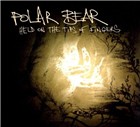 Like most contemporary bands, Polar Bear plays many different types of venues. Each one creates a different vibe, which the musicians recognize and exploit. Herbert doesn't declare a preference. "The interesting thing for me is that it really affects the way we play," he says. "I quite like it when we play to an audience that's sitting down because it creates an atmosphere in the room that's very different from where people are all standing up and close together and right up near the stage and it's hot. I enjoy the contrasts the different environments bring out in the music."
Like most contemporary bands, Polar Bear plays many different types of venues. Each one creates a different vibe, which the musicians recognize and exploit. Herbert doesn't declare a preference. "The interesting thing for me is that it really affects the way we play," he says. "I quite like it when we play to an audience that's sitting down because it creates an atmosphere in the room that's very different from where people are all standing up and close together and right up near the stage and it's hot. I enjoy the contrasts the different environments bring out in the music." With the release of Peepers, Polar Bear will spend much of the first half of 2010 touring. Rochford has longer term plans for the band, but prefers to keep them to himself. "I don't really like talking about that. Sometimes, when you talk about your plan, you don't do it. I have got some ideas about what I want to do, but I feel that to say them might actually stop me from doing them. I wouldn't want to say them and then not do them," Rochford says. Herbert and Rochford both laugh, but the bassist makes no attempt to get Rochford to reveal his plans, and talk turns to the new album.
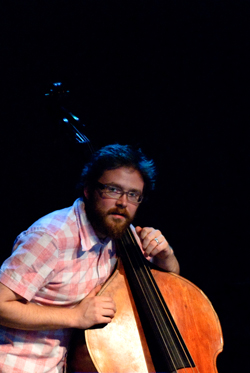 Peepers shows just how much range Polar Bear has as a band, from the beauty of "All Here" to the immediate danceability of the deceptively simple "Bap, Bap, Bap." All the songs are Rochford compositions, with the exception of two short improvisations—"Bump" and "Scream," both credited to all five band members—creating an overall sound that he already imagined before beginning to write. "The way my mind works is that I get a sound in my head of what I want an album to sound like. I feel like my subconscious goes, then I sit down and write the tunes based on what I've been thinking about for the last year or whatever, and the songs seem to come out in a certain mood," he says. "Definitely one thing I wanted to do was to explore different feelings of harmony. I also wanted this album to be as raw as possible, really spontaneous and live." All of the tracks were written and recorded specifically for the album, although not all at once. "We did two recording sessions, one in December 2008 and one in June 2009, because I wanted to record the tunes when we hadn't been playing them for very long," he says.
Peepers shows just how much range Polar Bear has as a band, from the beauty of "All Here" to the immediate danceability of the deceptively simple "Bap, Bap, Bap." All the songs are Rochford compositions, with the exception of two short improvisations—"Bump" and "Scream," both credited to all five band members—creating an overall sound that he already imagined before beginning to write. "The way my mind works is that I get a sound in my head of what I want an album to sound like. I feel like my subconscious goes, then I sit down and write the tunes based on what I've been thinking about for the last year or whatever, and the songs seem to come out in a certain mood," he says. "Definitely one thing I wanted to do was to explore different feelings of harmony. I also wanted this album to be as raw as possible, really spontaneous and live." All of the tracks were written and recorded specifically for the album, although not all at once. "We did two recording sessions, one in December 2008 and one in June 2009, because I wanted to record the tunes when we hadn't been playing them for very long," he says.The song titles on Peepers are notably descriptive of the tunes themselves. "Bap, Bap, Bap" describes that tune's sax riff almost exactly, while "Drunken Pharaoh" sets up mental images of a returning late-night reveler that match the tune's fractured, uncoordinated sound. While many writers choose titles for tunes almost arbitrarily, Rochford often takes a more considered approach, although not on every occasion. "I didn't have a title for 'Bap, Bap, Bap,' so I called it that because it describes the sound. 'Drunken Pharaoh' is someone we know, who was a bit drunk at one of our gigs. He said we should call the tune after him." Herbert interjects to clarify the details. "He was being quite rowdy in the audience, and I don't think he realized that Seb was gonna attach the drunken aspect," Herbert says.
Rochford explains that most of the other tunes are about specific things. "I remember the event and write the tune while I still have that feeling. 'Happy For You' is written about Pete and his new baby. ... I quite often write tunes that are influenced by people who I know or have met." One of the more unusual sounds on the album is on "Finding Our Feet"—an eerie, evocative and mystical sound that could be purely electronic or could be a sample. Leafcutter John was responsible, from start to finish, as Rochford and Herbert both explain. "It's John singing and sampling himself," Rochford says. Herbert offers some more details: "John does all of that stuff very much in the moment. The possibilities he has at his fingertips are incredible; what he can do with electronics is amazing. He's a very creative individual."
Herbert's own double bass playing is a distinctive part of the Polar Bear sound, but with The Invisible he plays bass guitar. The decision to concentrate on the acoustic instrument with Polar Bear is a conscious one. "It suits the sound; it just feels right," he says. "Also, for quite a while I was playing electric bass in

Acoustic Ladyland
band / ensemble / orchestraPolar Bear's popularity in the UK and Europe is established, but the band has not yet performed in North America. "It would be great to play America," Rochford says. "I'd love to play there. I go over quite often to New York, but it's mainly the financial stuff that stops the band going over. Also, our albums are only just being made available in the States—so maybe this is the time for us to go over there."
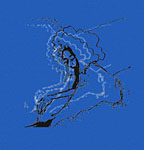 For Peepers, the band signed with Leeds-based Leaf Records. Once again, Rochford gives personal as well as professional reasons for the decision. "I met Tony [Morley, the label boss] a couple of years ago, and I really liked him. He used to come to gigs when we played up in Leeds. I really like the music he puts out, and I've always found him to be an honest person, so asking him if we could join the label felt like the right thing to do." The Leaf roster is small, but eclectic—an attraction for Herbert, who declares, "We fit right into that roster. There are a lot of bands on the label that you can't pigeon-hole ... bands like A Hawk and a Hacksaw and Wildbirds and Peacedrums, who are fantastic." Such diversity seems to reflect the label's ethos, which also appeals to Herbert. "It's an attitude, stylistically, that shows what Tony wants from his label," he says.
For Peepers, the band signed with Leeds-based Leaf Records. Once again, Rochford gives personal as well as professional reasons for the decision. "I met Tony [Morley, the label boss] a couple of years ago, and I really liked him. He used to come to gigs when we played up in Leeds. I really like the music he puts out, and I've always found him to be an honest person, so asking him if we could join the label felt like the right thing to do." The Leaf roster is small, but eclectic—an attraction for Herbert, who declares, "We fit right into that roster. There are a lot of bands on the label that you can't pigeon-hole ... bands like A Hawk and a Hacksaw and Wildbirds and Peacedrums, who are fantastic." Such diversity seems to reflect the label's ethos, which also appeals to Herbert. "It's an attitude, stylistically, that shows what Tony wants from his label," he says. Polar Bear's star continues to rise as part of what seems like an increasingly vigorous and creative UK jazz scene. Do Herbert and Rochford share this view of British jazz? Once again, Rochford pauses for thought and Herbert answers first. "I think the scene's really healthy. The people I come across, especially the younger players, have a very open attitude. It seems like there are loads of bands forming with very different sounds and loads of influences," he says. "We played the Jazz Cafe recently with Zed-U and Troyka supporting us—two really amazing and creative bands with world-class playing." Rochford also feels positive about the UK scene. "I feel very proud of all the music that's coming from the UK, from people like

Kit Downes
keyboardsb.1986

Stan Tracey
piano1926 - 2013

Evan Parker
saxophone, sopranob.1944
 Polar Bear, from left: Leafcutter John, Tom Herbert, Mark Lockheart Pete Wareham, Seb Rochford
Polar Bear, from left: Leafcutter John, Tom Herbert, Mark Lockheart Pete Wareham, Seb Rochford
The final word goes to Herbert: "I just wanted to say that a lot of bands I come across seem to be creating their own sounds. America is still a big influence on jazz—a lot of players are assimilating that, but they're creating something that sounds really British. It doesn't seem like a conscious thing, but it feels like people are allowing themselves to make music which is representative of them. That's really inspiring."
Selected Discography
Polar Bear, Peepers (Leaf Records, 2010)
The Invisible, The Invisible (Accidental Records, 2009)
Acoustic Ladyland, Living With A Tiger (V2 Records, 2009)
Mark Lockheart, In Deep (Edition Records, 2009)
Polar Bear, Polar Bear (Tin Angel, 2008)
Leafcutter John, The Forest And The Sea (Staubgold, 2006)
Polar Bear, Held On The Tips Of Fingers (Babel, 2005)
Mark Lockheart, Moving Air (Basho Records, 2005)
Polar Bear, Dim Lit (Babel, 2004)
Leafcutter John, The Housebound Spirit (Planet Mu, 2003)
Photo Credits
Page 1, Top: Courtesy of The Leaf Label
All Other Photos: Bruce Lindsay
Tags
Comments
About Polar Bear
Instrument: Band / ensemble / orchestra
PREVIOUS / NEXT
Support All About Jazz
 All About Jazz has been a pillar of jazz since 1995, championing it as an art form and, more importantly, supporting the musicians who make it. Our enduring commitment has made "AAJ" one of the most culturally important websites of its kind, read by hundreds of thousands of fans, musicians and industry figures every month.
All About Jazz has been a pillar of jazz since 1995, championing it as an art form and, more importantly, supporting the musicians who make it. Our enduring commitment has made "AAJ" one of the most culturally important websites of its kind, read by hundreds of thousands of fans, musicians and industry figures every month.



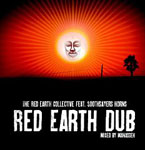
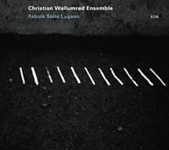

 Buy Now
Buy Now



















